Unlike in football, where such action could earn you the red card, loud appeals to the umpire (referee) by players is very much a lawful part of the game of cricket.
To seek an umpire’s decision as to whether a batsman has been dismissed, players from the fielding team usually yell “howzat!” and await the match official’s ruling.
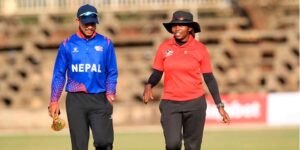
The term “howzat” is a corruption of “how’s that” and is an allowable appeal under Law 31 of the 42 Laws covering the game of cricket.
“Howzat!” appeals by players are often so loud that, at times, they could intimidate shaky umpires into inadvertently giving batsmen out.
“Sledging” is another form of vocal intimidation in cricket, but targeted at the opposing team (often the opposing batsmen) by players seeking to gain psychological advantage and unsettle their rivals.
“Sledging” is actionable if it borders on racist insult or personal attack.
Don’t ask Kenyan legend Maurice Odumbe what English strike bowler Darren Gough yelled at him during their 1999 Cricket World Cup match on his way to claiming four Kenyan wickets in England’s nine-wicket victory at the St Lawrence Ground in Canterbury, England…
It certainly wasn’t pleasant!
Intimidating female umpires
Over the centuries, cricket has been a male-dominated sport with, for instance, the women’s game introduced in the Commonwealth Games only last month at the Birmingham edition in England.
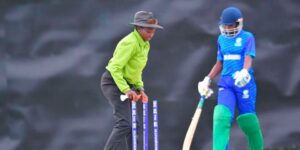
The loud appeals and sledging by cricket players turn out even more intimidating to female umpires, who are quite few and far between, officiating the men’s game.
Lydia Kaparo, for instance, is currently the only female Kenyan international umpire, having defied the odds and withstood loud appeals from intimidating players to curve out a niche for herself as one of the most promising female officials of the game.
She took up the umpiring role almost three decades after the trailblazer, Senior Counsel Zehrabanu “Jackie” Janmohammed, stood down after breaking ground as the first Kenyan international woman umpire.
Besides Kaparo, several other Kenyan women have taken up cricket umpiring, including former internationals Margaret Banja, Jane Achieng, Marcelline Adhiambo and wicket-keeper Sarah Bakita.
“But Kaparo stands out as she’s a go-getter,” cricket coach-cum-writer Dun Okinyo describes the 32-year-old official.
“She has something that most of us lack, as she really pushes herself to achieve whatever she sets her sights on.”
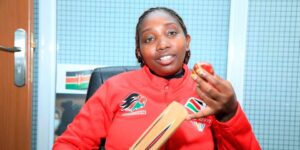
Hockey player-turned cricketer Kaparo’s story is an interesting one. She developed her love for cricket just by chance, growing in the game steadily under the wings of Okinyo.
Also an avid tennis player, Kaparo excelled in hockey while in school at Ngiriambu Girls High School in Kirinyaga County.
One of businessman Mohammed Kaparo and teacher Agnes Kaparo’s five daughters, she turned out for Sliders Hockey Club as forward and goalkeeper.
Longest three-and-a-half-hours
Before that, she had been scouted from school as one among four student players drafted into Kenya’s under-21 hockey team’s tour of Egypt, before straying into cricket.
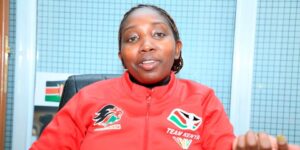
Straying into cricket, quite literally, because one Friday in 2009, Kaparo’s friend urged her to join a Kenya national women’s cricket team’s training session in Nairobi.
“The training session lasted one hour. The following Sunday, the ladies were playing an internal training match and put me on the field,” she recalls during our chat at Nation Centre last week.
“I didn’t know the rules. I just knew that I had to catch the ball to get someone out… I didn’t know you could run someone out or the other ways of dismissing a batsman.
“I was just there waiting for the ball and throwing it back to the wicket-keeper. She’s the only person I thought could get someone out… It was a big challenge and the longest three-and-a-half-hours since I joined cricket!”
But later, Okinyo, who was coaching the women’s team, asked Kaparo to turn up every Sunday for league matches.
“At the time, we were playing in the Nairobi Provincial Cricket Association League, but in Division Two as Team Kenya, the only ladies’ team playing in the men’s Division Two league.
“I wanted to learn the rules so every Sunday I would attend the sessions.”
Perhaps the best way to learn the game of cricket is by taking the scores at matches.
“The coach asked me to sit down and do the scoring. By scoring, I would be able to watch the game and learn.
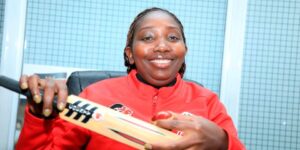
Tour of Uganda
“It became so easy for me to score and understand how the game was being played. That really helped,” she recalled.
“Three Sundays later, I was able to get to the field and join the team. I never stopped training and since then, and cricket became my favourite sport out of all sports I have played.”
And, just like that, Kaparo made it to the Kenya national women’s cricket team’s tour of Uganda, playing until 2016 with her last international assignment being the team’s tour of South Africa in 2015. “In 2016, I was promoted to team manager as I couldn’t attend training as much as I wanted to due to work and studies.
“And so I was team manager to South Africa and then Namibia for the World Cup qualifiers.”
Kaparo played the role of team manager until 2020 when she went back to Kenyatta University for her degree in sports administration and management, returning to national duty as a chaperone.
“At that time, I also started umpiring. I love umpiring and I really enjoy it.”
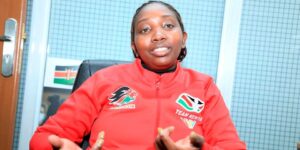
Kaparo’s first official umpiring assignment was in June this year in Rwanda at the “Kwibuka” tournament, and her most recent just a week ago during Nepal’s tour of Kenya.
“I was the only lady in the umpiring panel for the Nepal series which I’m proud of since it has been so long since we had a woman umpiring at a game.”
Obviously, the loud appeals by male players have been her biggest challenge yet, but she’s taken it in her stride and remained firm.
“The first time I started umpiring in the league, you’d find the men wanting to keep on appealing to intimidate me and see what I would do. “But I took it as a challenge and the more matches I continued officiating, the more respect I got from the teams and the more good reports I received, and that’s what has pushed me to where I am.”
Kaparo, a sports teacher at Nairobi’s Peponi School, hopes her nerves of steel will encourage other female umpires to break the glass ceiling.
“I’m the first Masai woman to play for Kenya in hockey and cricket…” she jokes, adding that she doesn’t mind the nickname “Masai.” For she’s a go-getter, having played an integral role at the National Olympic Committee of Kenya in preparing Kenya’s athletes to successfully navigate strict Covid-19 protocols to feature at last year’s Tokyo Olympic Games.
“It (preparing Team Kenya for the Tokyo Olympics) was a special opportunity for me, as I met people I never dreamt I would meet, like (marathon legend) Eliud Kipchoge and (sprints sensation) Ferdinand Omanyala,”reflects Kaparo who, in 2020, also sat on the selection panel for the national women’s cricket team’s tour of Rwanda.
All this and “Masai” — who has also had tennis and cricket coaching stints at Cavina and St Christophers schools — is just getting started…
Certainly one to watch on several fronts, and on the cricket grounds in particular.
Credit: Source link